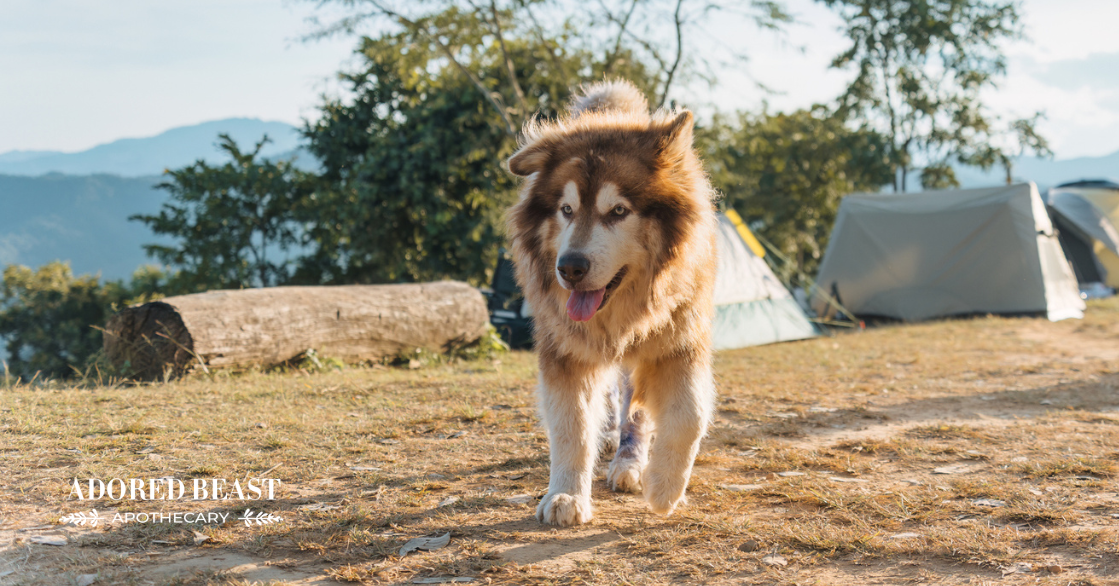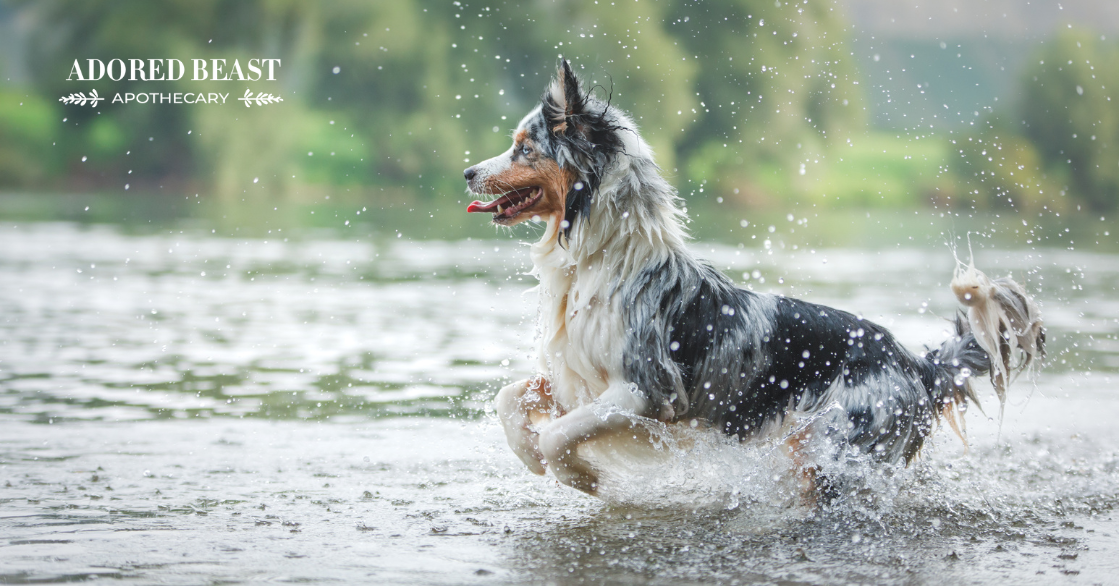If your dog frequently deals with tummy troubles like diarrhea, gas, or bloating, you might be wondering if it’s something more than just a sensitive stomach. One possible culprit? Irritable Bowel Syndrome (IBS).
IBS in dogs is a functional gastrointestinal disorder that can be frustrating to manage, but the good news is, with the right natural support and lifestyle changes, many dogs experience fewer flare-ups and better digestion.
Let’s break down the ins and outs of IBS, what it looks like, and how you can manage it naturally. But first… is IBS the same as IBD?
IBD vs. IBS in Dogs: What’s the Difference?
IBS (Irritable Bowel Syndrome) and IBD (Inflammatory Bowel Disease) often get confused. While they affect the same system – the digestive tract – they are not the same thing.
Here’s the difference:
- IBS in dogs is considered a functional disorder, meaning the gut looks normal on diagnostic tests but doesn’t function properly. It’s often linked to stress, anxiety, or food sensitivity, and is not inflammatory in nature.
- IBD in dogs, on the other hand, involves chronic inflammation and damage to the intestinal lining. It is a medical condition driven by an overactive immune response and is usually more serious.
So, while both IBS and IBD can cause similar symptoms like diarrhea or vomiting, IBD causes physical inflammation, whereas IBS is more about disrupted gut function, often triggered by emotional or dietary factors.
Signs and Symptoms
IBS symptoms in dogs tend to come and go, often flaring up during times of stress or after dietary changes. The symptoms can mimic other digestive issues, so a proper vet diagnosis is important to rule out more serious conditions like IBD, parasites, or infections.
Common signs of IBS include:
- Intermittent diarrhea or loose stools
- Straining to poop, or small amounts of mucus in stool
- Gas and bloating
- Abdominal discomfort or whining
- Gurgling sounds in the belly
- Occasional vomiting
- Licking lips or eating grass
- Symptoms that worsen during stress or after a new food or treat
Natural Ways to Manage IBS in Dogs
Since IBS doesn’t cause lasting damage to the intestines, natural management is often quite successful! The key is to reduce gut irritation, manage stress, and support healthy digestion.
Here are some holistic strategies that may help:
1. Simplify the Diet
Food sensitivities can play a big role in triggering IBS episodes. Many dogs with IBS benefit from:
- A limited-ingredient diet
- Novel proteins like duck, rabbit, or venison
- Avoiding common irritants like chicken, beef, wheat, dairy, or soy
- Feeding a fresh or gently cooked diet with whole, clean ingredients
Keep a food journal and eliminate any treats or table scraps that might be irritating your dog’s gut. Slowly introduce new foods one at a time to watch for reactions.
2. Add Gut-Soothing Herbs
Some herbs can gently calm the digestive system and reduce spasms or irritation:
- Slippery elm – coats the digestive tract and soothes inflammation
- Marshmallow root – another demulcent that helps reduce irritation
- Chamomile – mild anti-inflammatory and calming for both gut and nerves
- Fennel – helps relieve gas and bloating
Always use herbs in dog-safe forms and consult a holistic vet for appropriate dosing.
You’ll find several gut-soothing herbs and neutraceuticals in our Gut Soothe.
3. Support the Gut with Probiotics
A healthy gut microbiome can dramatically improve IBS symptoms. Probiotics help regulate digestion, improve stool quality, and balance out the “good” bacteria in the gut. Use a canine species-specific probiotic containing many different strains. Also, don’t forget the prebiotics. These feed probiotics, helping them to flourish and thrive in the digestive tract. Our pick? Fido’s Flora!
4. Use Digestive Enzymes
Some dogs struggle to properly break down their food. Digestive enzyme supplements can assist in nutrient absorption and reduce bloating or gas. These can be especially helpful when switching to a new diet or if your dog eats cooked food, which lacks natural enzymes. Our go-to for digestive enzymes is Healthy Gut.
5. Manage Stress and Anxiety
Stress is a major trigger for IBS in dogs (as well as many other health conditions). To help minimize flare-ups:
- Maintain a consistent daily routine
- Avoid chaotic or high-stress environments
- Provide mental stimulation through enrichment games, training, and sniff walks
- Use calming tools like:
- CBD oil
- L-theanine
- Bach flower remedies
- Calming pheromone sprays or collars
Some dogs benefit from behavioural support or working with a trainer to address underlying anxiety.
We have many more tips for managing stress in this post: Stress in Dogs.
6. Hydration
Dehydration can make symptoms of IBS worse, especially if diarrhea is involved. You want to keep your dog hydrated. Make sure there’s always plenty of fresh water available, and you might even just add more water to their food.
Consider adding homemade bone broth to meals. It’s rich in amino acids and minerals that help soothe and nourish the gut lining. You can buy it pre-made (no onions, please) or make your own. Here’s how we make it.
IBS in dogs may not be life-threatening, but it can seriously impact your dog’s comfort and your peace of mind. The good news is that with a natural, supportive approach, many dogs experience fewer symptoms and better digestion. Explore a combination of diet changes, gut support, and stress reduction to get their tail wagging again.












